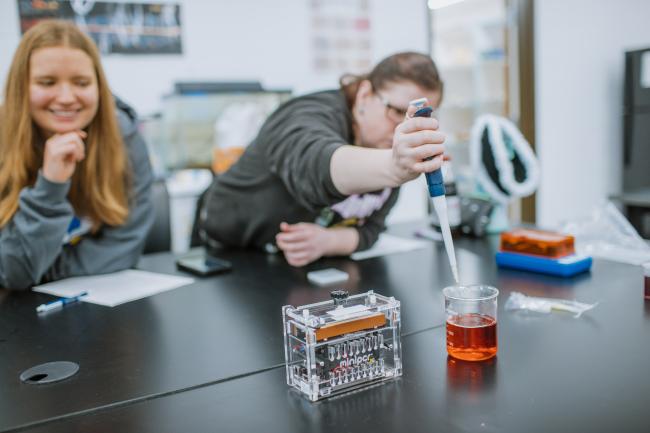The future is now! And an Associate of Science (AS) degree from CEI will help you join and shape that future. With multiple STEM pathways available, your AS from CEI can be personalized to your particular interests.
What is an Associate of Science Degree?
By completing the required 36 credits worth of General Education courses at CEI, you can use the remaining 24 credits to move you along the path to your educational goals. Because the Associate of Science is so flexible, you have the power to design your unique degree, which can set you up for success at your transfer institution. Simply identify the pathway you want, work closely with advisors, and arrive at your desired four-year institution as a Junior!
And by offering a wide range of learning experiences and modalities, faculty here at CEI meet you where you are and empower you to complete your journey toward success.
- For an Associate of Science (AS), at least two additional courses must be from Mathematical and/or Scientific Ways of Knowing
Prerequisites
Courses may require prerequisites or placement. All 199 (special topics) classes may or may not have prerequisites depending on the topic:
- ACC 202
- BIOL 202
- BIOL 228
- BSN 216
- BSN 217
- CHEM 101
- CHEM 102
- CHEM 111 (has concurrent classes that must be taken during or prior)
- ECON 201
- ECON 202
- EGR 120 (has concurrent classes that must be taken during or prior)
- ENGL 101P (must be taken with ENGL 101)
- ENGL 102
- ENGL 175
- ENGL 203
- ENGL 206
- ENGL 215
- ENGL 235
- MATH 123
- MATH 130
- MATH 143
- MATH 144
- MATH 147
- MATH 153
- MATH 160
- MATH 170
- MATH240
- NATH 275
- PHYS 111
- PHYS 112
- PHYS 211
- PHYS 212
- PSYC 211
- PSYC 225
- PSYCH 250
- SOC 102
- SOC 248
- SPAN 102
- ZOOL 280
Advising utilizes Major Pathways; these are suggested classes if you have a future BA in mind. Some courses may need to be petitioned for credit when transferring to a four-year university. We recommend you speak to your advisor for guidance with Major Pathways.
Math & Science FT
| Name | Title | Room | Ext | |
|---|---|---|---|---|
| Bowman, Kole | Chair | 129 | 5627 | Kole.Bowman@cei.edu |
| Baxter, Jen | Faculty | 101F | 5633 | Jennifer.Baxter@cei.edu |
| Braun, Janet | Faculty | 129 | Janet.Braun@cei.edu | |
| Burrows, Ben | Faculty | 129 | 5653 | Benjamin.Burrows@cei.edu |
| Clausen, Cynthia | Faculty | 129 | 5467 | Cynthia.Collin@cei.edu |
| Hemming, Charlie | Faculty | 125A | 5606 | Charles.Hemming@cei.edu |
| Jolley, Sharlene | Faculty | 505 | 5384 | Sharlene.Jolley@cei.edu |
| Judy, Kathy | Faculty | 125B | 5405 | Kathleen.Judy@cei.edu |
| O’Hearn, Pamela | Faculty | 129 | 5611 | Pamela.OHearn@cei.edu |
| Pitts, Betsey | Faculty | 101F | 5333 | Betsey.Pitts@cei.edu |
| Taylor, Matt | Faculty | 129 | 5412 | Matthew.Taylor@cei.edu |
| Krumenacker, LJ | Faculty | LJ.Krumenacker@cei.edu | ||
| Rebecca Holmes | Coordinator 1 | 5631 | rebecca.holmes@cei.edu | |
| Jacob Haeberle | Dean | 101G | 5308 | jacob.haeberle@cei.edu |
General Education Matriculation
General Education Matriculation (GEM) for Idaho higher education refers to a set of core courses that students in Idaho's public colleges and universities are required to take to graduate. These courses are typically in English, math, science, and social studies and are intended to provide students with a well-rounded education and a strong foundation in the liberal arts. GEM “stamped,” or approved as GEM, courses may vary by institution, so students need to check with their school to see which courses are required for graduation.
The six GEM competency areas are:



 BACK TO PROGRAMS
BACK TO PROGRAMS

